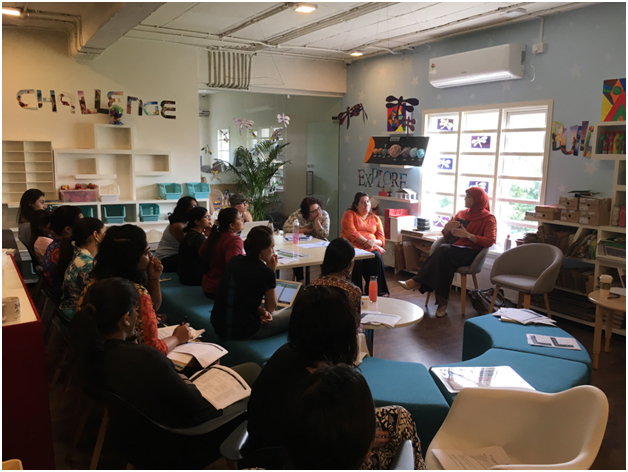 New York Academy has a progressive, American curriculum where students not only attain high levels of academic achievement, but also learn to learn. Our students are engaged in learning to apply knowledge in innovative, dynamic ways. Our curriculum is explicit and intentional at growing self-directed, passionate lifelong learners.
New York Academy has a progressive, American curriculum where students not only attain high levels of academic achievement, but also learn to learn. Our students are engaged in learning to apply knowledge in innovative, dynamic ways. Our curriculum is explicit and intentional at growing self-directed, passionate lifelong learners.
The New York Academy curriculum is built upon a framework of learner outcomes with the aim of having our students “know, understand, and be able to apply” concepts and skills to make a difference in the world. It is through our curriculum framework that New York Academy students advance their academic achievement, and grow their social and emotional development.
The following presents the framework of our curriculum:
School Wide Learning Results
School Wide Learning Results are the foundation of learning and make the connection between content and values. The New York Academy School Wide Learning Results are:
- Independent Learner
- Effective Communicator
- Critical Thinker
- Dynamic Achiever & Innovative Problem Solver
- Ethical Individual
- Global Citizen
Enduring Understandings & Essential Questions
Enduring Understandings are statements summarizing important ideas and core processes that are central to a discipline (subject area) and have lasting value beyond the classroom. They synthesize what students should understand-not just know or do-because of studying a content area. Importantly, Enduring Understandings are big ideas that can be transferred to many situations to solve problems. An example of an Enduring Understanding for reading comprehension is:
Essential Questions are questions that are not answerable with finality in a single lesson or a brief sentence. Their aim is to stimulate thought, to provoke inquiry, and to spark more questions. They are provocative and generative. By tackling such questions, learners are engaged in uncovering the depth and richness of a topic that might otherwise be obscured by simply covering it. Essential Questions can complement Enduring Understandings. An example of an Essential Question, which compliments the enduring understanding above, is:
How do the character’s desires and struggles reveal the author’s message and purpose of the story?
Learning Points and Learning Standards
Learning standards are concise, written descriptions of what students are expected to know and be able to do at a specific stage of their education. Educational standards describe learning objectives-i.e., what students should have learned by the end of a course, grade level, or grade span, but they do not describe any teaching practice (the methods of instruction, or pedagogy, adopted by a school).
New York Academy has adopted the AERO Standards, which are a robust set of learning objectives with high expectations. Many of the top international schools around the world have adopted the AERO Standards.
Working from the AERO Standards, New York Academy crafts Learning Points for instruction and lessons to make explicit and intentional students’ learning day-by-day and week-by-week. Examples of a standard with learning points are:
AERO Standard for Reading Comprehension
Quote accurately from a text when explaining what the text says explicitly and when drawing inferences from the text.
Learning Points for the AERO Standard for Reading Comprehension
- Readers think about the character’s desires and struggles.
- Readers walk in the shoes of the character, pulling themselves into the imaginary world of the story.
- Readers determine a character’s personality traits and anticipate the character’s response to events.
Cognitive Processes and Critical Thinking
Cognitive Processes might be referred to as the ABCs of critical thinking. To make meaning, learners are guided to exercise cognitive processes as a habit of mind when thinking. The following cognitive processes are used with the New York Academy Learning Points:
- Activate & Connect Background Knowledge
- Visualize
- Generate Questions
- Make Inferences
- Gain Perspective &Empathy
- Compare & Contrast
- Identify Cause & Effect
- Analyze & Synthesize
- Determine Importance
- Monitor Comprehension
New York Academy is proud and appreciative of the commitment and dedication of our faculty.
A school can have the best curriculum, but without the effective delivery of it by teachers, the curriculum will not be effective.
Once a month our faculty meets on a Saturday to collaborate as a professional learning community.
This October we gathered to continue working on building our Curriculum Maps and Units of Study to bring our Curriculum Framework to life.


